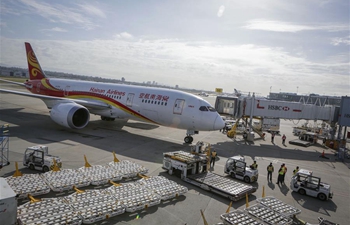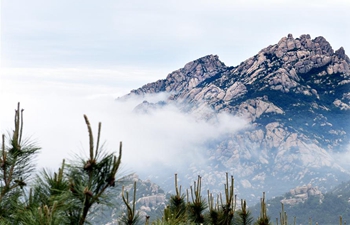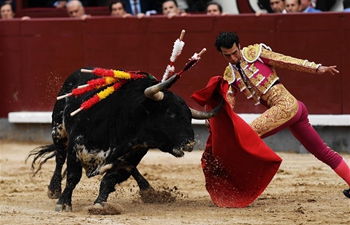by Xinhua writers Cheng Lu and Ni Yuanjin
BEIJING, May 26 (Xinhua) -- What can you say about a 69-year-old man who scales the highest mountain in the world? That he has had his legs amputated below the knees and survived cancer, perhaps?
Xia Boyu reached the summit of Mount Qomolangma on May 14, seven days after leaving base camp on the Nepali side.
"I knew I would make it to the top sooner or later, but I didn't expect it to take 43 years," said Xia, who is recovering from frostbite in a Beijing hospital.
Xia failed to summit the 8,844-meter peak four times before becoming one of the very few double amputees to reach the top of Qomolangma. New Zealand climber Mark Inglis was the first to reach the summit in 2006.
Although it took Xia decades to realize this dream, he stayed less than 10 minutes at the top due to a nasty blizzard. In those 10 minutes, he did several things. Gripping his climbing poles, teetering on his titanium alloy prostheses, he looked down on the mountain which took his feet from him in his first attempt four decades ago.
Then he called base camp where staff patched him through to his wife in Beijing.
"I'm finally standing at the top of Qomolangma which I have been dreaming about for 41 years," he announced, his voice trembling.
"It should have been 43 years. I was too excited and made a mistake," he quipped from his Beijing sickbed.
He planned to take two pictures -- one holding high Chinese flag, and another pointing to the sky with his climbing pole, oxygen mask removed to show his face -- but his plan was ruined.
"Several climbers who were already at the top rushed to take photos with me. When I tried to take a selfie, a snowstorm forced me to descend," he said.
Then, facing into the wind, he forced his body to carry on down, knowing that the struggle had only just begun.
His artificial legs have no feeling. He uses as twice energy as able-bodied mountaineers. Low temperatures and so much walking caused his residual legs to swell and the prostheses did not fit as snuggly as they should. Many times, his feet got stuck in cracks in the ice and his Sherpa guide had to help pull his legs out.
Then there is the snow. The lenses of his glacier glasses were covered with a layer of ice.
"Everything was white. I couldn't see clearly. I thought I was finished. The only thing I could do was to hold tight to the rope and keep moving on," he recalled.
It took Xia two days to descend to base camp, over 3,000 meters below.
LIFE IS THE MOST IMPORTANT THING
Born in Chongqing in 1949, Xia grew up in Qinghai Province. He was good at football. Ke Qingfeng, one of his friends, jokes that Xia's disability was a big loss for Chinese football.
Xia was chosen by the Chinese mountaineering team in 1974 when he was working in a foundry.
"I heard that a free health check and a trip to Beijing were on offer if I applied to be a mountaineer," he recalled. He didn't realize this decision would change his life.
The first Chinese team reached the summit of Qomolangma in 1960. In 1975, the second expedition, including Xia, set off.
Xia and some teammates encountered a snowstorm just 200 meters below the summit and were forced to descend. Nine climbers eventually reached the summit, but Xia suffered severe frostbite and lost both his feet. He heard the news of their success on the radio as he lay in his sickbed, awaiting the amputation.
"I was proud of my teammates but sad because I was not among them. I didn't dare to imagine my future, perhaps sitting in a wheelchair forever," he recalled.
He felt hopeless until a doctor told him that on artificial limbs, he could live a life like anyone else, and might even take quite a lot of physical exercise. His hopes were raised and he set himself a target: he would scale Qomolangma.
The specter of the mountain that came close to taking his life gave him the courage and hope to live on.
Xia made three attempts, in 2014, 2015, and 2016, but was defeated by an avalanche, an earthquake and bad weather.
In 2016, he was closer to the summit than ever before. With only about 100 meters to go, he had to turn back when a blizzard set in.
"I knew I was running out of time. It might be my last chance. I had an impulse to rush to the top even though I knew I would die there," he said, but when he looked back and saw the Sherpa guides behind him, he was in a dilemma.
"They were in their twenties or thirties and take these risky jobs just to feed their families. They should not have to die for my dream."
And he decided to descend.
Some argue that Xia sets a bad example for physically disabled people who might risk their lives in spurious challenges.
Xia never thought that his dream may affect others. Everyone should consider their own position -- physical strength, professional training and experience -- before setting out on any quest, he said.
"Don't act on impulse. In all circumstances, life is the most important thing," he said.
PERSISTENCE BEYOND IMAGINATION
Before retirement, Xia managed the archives at Chinese Mountaineering Association. He took part in various Paralympic games and international rock climbing competitions. He has won dozens of medals.
Twenty years on, he was hit by further bad fortune. He was diagnosed with lymphoma and his legs were amputated below the knee. But the mountain loomed large as ever in his heart.
Xia attributes his success to being versatile and physically strong, a high tolerance of cold, and persistence.
His persistence is beyond most people's imagination. To prepare for the fifth climb, he got up at four in the morning and completed 90 minutes of strength training at his Beijing home including 1,500 squats, 100 pull-ups and 360 push-ups. Then he rode a bike to Fragrant Hills, 20 kilometers from his home, for climbing training.
He hiked through the Tengger Desert and climbed many other high mountains such as Muztagh Ata, Yuzhu Peak, Balang Mountain and Mount Siguniang.
Climbing Qomolangma is an expensive hobby for a man with only around 6,000 yuan (940 U.S. dollars) of pension so, to seek sponsorship, he appeared in a few reality shows.
"I didn't want to be overexposed to public but I needed money," said Xia, who calculates that he spent 350,000 yuan of his own money, besides sponsorship.
A set of top equipment for a Qomolangma climb costs around 100,000 yuan. The fees paid to expedition companies which provide food, accommodation, training and guides for climbers range from 300,000 yuan to 500,000 yuan, Xia said.
Every time he leaves home on mountaineering expedition, he reminds his wife and son of many things over and over -- when to pay utility bills and what insurance he purchased, just as if he will not return.
"I always tell my wife and son that this is the last time [to scale Qomolangma], and always break my promise," he said with honest self-reproach. "They don't try to stop me. Perhaps because they know I've experienced many hardships and don't want me to have regrets, or perhaps they know I can't be stopped."
He nicknamed his son "Deng Deng" which literally means "climbing and climbing," but it doesn't mean he hopes his son will follow in his footsteps. "I just hope he remembers that his father is a mountaineer," he said.
His son, Xia Dengping, arrived at the base camp unannounced to give his father a surprise welcome. It was the first time he had seen Qomolangma.
"Successful or not, I felt it would be my dad's last attempt at Qomolangma. I should support him. Also, my mother said 'you should go'," Xia Dengping said. "She doesn't support him much but she supports me supporting him."
The backpack and down jacket used by Xia on his first climb in 1975 are kept at his home. He has used the same backpack in his subsequent attempts.
Xia's story is being made into a documentary. When asked about his future, he has no idea. "I'm tired and want to have a good rest."
When reports say he conquered Qomolangma, he demurs.
"It is Qomolangma who accepted me. Nature cannot be conquered, but people can," he said.

















